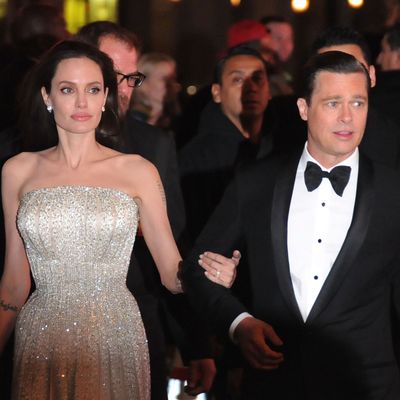
Remember the old days, when celebrities got divorced and everyone always imagined the husband as some delightfully feral animal that the poor jilted wife could never tame? You’d read that Bogart or Sinatra went out boozing and carousing with women until their marriages fell apart, and you’d think, (insert brassy ’40s-heroine voice) “That poor broad was foolin’ herself, thinking she could pin Ol’ Blue Eyes down once and for all!”
Something has shifted. Because when we read about the end of Brangelina — and the allegations that Brad Pitt has been drinking and smoking pot too much and has anger problems, as reported by TMZ, or the darker rumors of hard drugs, Russian call girls, and an affair with Marion Cotillard on “Page Six” — we feel something we never expected to feel in our lifetimes: pity for Brad Pitt.
Because even though Pitt seems to be living what we once considered every man’s best life, boozing and sexing it up like a rock star, he now conjures the same specter that Sad Affleck does: the depressed boy who didn’t know how to grow up and live up to the expectations of his wife. He clearly intended to become the loyal husband and endlessly patient and loving dad that Jolie assured us he already was when she was casting her dreamy word-spells on the press. Brad wanted to be good! But Brad still liked cigarettes. He just liked them, goddamn it! Liking them meant he was weak, Angie always told him, but he liked them anyway, so screw her!
These are the kinds of absurd little cartoons playing out in my treacherous mind at the moment, at any rate. Jolie is the evolved (if slightly manipulative) adult and Pitt is the petulant (if slightly vulnerable and therefore slightly more sympathetic) child. Although that’s obviously the kind of story that Jolie’s publicist and lawyer might encourage when seeking full custody (as Jolie apparently is), even when the question of divorce isn’t on the table, Jolie and Jennifer Garner and a slew of other female celebrities today have a habit of putting their high-achieving, clean-cut maternity front and center at all times. This is how you play well in Peoria: You make it clear that your enormous ego takes a distant second to the maternal thrills of playing Monopoly with your offspring for the 16 thousandth time in a row.
What’s interesting is that, against the backdrop of the modern, supportive egalitarian partnership, cheating is no longer seen as a scandalous but exciting crime so much as a pathetic grab for personal power. Even if you don’t buy the idealistic spin that seems to be offered up by Jolie’s team, the one that casts Pitt as the wrecking ball (but please note, while assiduously avoiding making Jolie look like The Other Woman done in by Yet Another Other Woman), it’s still hard to shake off the picture of a strong woman, who doesn’t want to waste her energy on anything that doesn’t bring her life joy and meaning, being trailed around by a guy who’s a little depressed and confused and not sure what’s worth living for, beyond the temporary fixes of drugs and booze and lady companions.
If celebrities are a blank canvas upon which we project our own aspirations, desires, and, fears, then it’s interesting that the portrait we’re painting as a culture has shifted so drastically. Instead of seeing a man who has more adventurous, exciting things to do than savor the company of his army of offspring, we see Brad Pitt as a kind of fallen hero, once dashing and devil-may-care, who has slowly lost his grip on happiness. We don’t see a guy like Sinatra, one who’s too busy, confident, and callous to slow down for his lady. (As Sinatra famously boasted to a crowd, upon marrying Mia Farrow, “I finally found a broad I can cheat on.”) We see a man who seems haunted by his partner’s clear vision of how her life should look, and who couldn’t stand to have all of his weaknesses and insecurities shoved in his face by the mature, empowered woman by his side (or, you know, off saving Syrian refugees while he putzes around with her semi-estranged, similarly lost dad, Jon Voight).
For a married man in 2016, playing the villain is just a lot less fun (and acceptable) than it used to be. Go on a drug bender while your kids are at home, and the world doesn’t cheer you on the way it did back when Jimmy Page was snorting cocaine and sleeping with teenagers. Sure, it’s a little easier to cheer on Jolie’s humanitarian pursuits than it is to root for Pitt’s alleged wild nights or Affleck’s dalliances with the nanny (an incident that Garner would only deign to hint, in the most disappointed-parent tone possible, amounted to making bad choices). But maybe we’re privileging charity and playground photo ops over activities that might feel just as invigorating and life-affirming — albeit far less easily photographed and placed on the pages of People magazine.
Maybe we’re hesitant to admit that merely “playing house” (as my own restless dad liked to call it) gets old not just for men but for all of us at some point. Not that we’re all designed to cheat, but we’re all designed to want a more balanced life than the one we now treat as the Platonic ideal of domestication: total surrender to kids’ agendas, around the clock. Maybe we need more excitement and adventure built into our lives even after we’ve been thoroughly domesticated. Maybe we’re at a strange cultural juncture where we expect way too much from each other, and the truth is that few human animals are built to savor spending all of their downtime with small humans — particularly doing so in the vacuum-sealed isolation of an overseas celebrity compound staffed by an army of strangers.
It takes a village. And although most of us only have two adults and one small hut, maybe that kind of intimacy is friendlier to a marriage than an actual village of paid employees who make life very easy but who are also always around, witnessing your slow downward spiral. When you live in a kind of Disneyland that’s also a prison, and you can’t step outside without being photographed with headlines like MARRIAGE ON THE ROCKS and BRAD IS MISERABLE, how could you be anything but miserable? (And then your wife writes a screenplay about a broken marriage in which you both star.)
The easiest, laziest answer to this puzzle is that Jolie surpassed Pitt’s ability to deal with her or satisfy her needs. But the more complicated answer is the one that plays out in our relationships, marriages, and families privately all the time: Even when you’re suspicious of gender roles and utterly dedicated to an egalitarian partnership, it’s still hard to find a balance of work and power that allows both partners to feel satisfied and at ease. There’s a vulnerability that comes with having babies and relying on your partner not to get bored and wander off while you’re immobilized under a pile of suckling humanity. But there’s also a vulnerability that comes with trading in your childhood notions of being the leader, hunter, gatherer, and big boss of every room you enter for a role as loyal sidekick to a seemingly wiser, more courageous, more formidable matriarch.
Ultimately, though, we don’t have to choose between one story of a jilted broad who some restless fella up and left for a brand-new dame, and another story of a depressed wimp who was emasculated by his overbearing wife as the patriarchy slowly but surely collapsed around him. When you subtract our gendered allegiances from the picture, what you see in the Jolie-Pitt divorce are two people trying to build a life under extraordinary circumstances. When you’re bouncing between the rarefied habitats of studio back lot, Parisian compound, and diplomatic mission to Ethiopia, your darkness has a lot of fertile acreage on which to grow. Maybe the hothouse of celebrity life, like marriage itself, simply tends to expose which individual has a better handle on their own darkness.
Update: Brad Pitt is now reportedly under investigation for child abuse.




